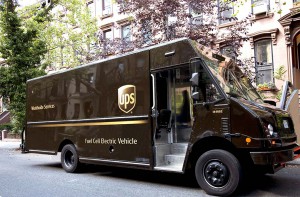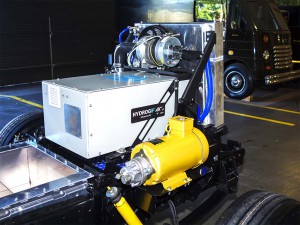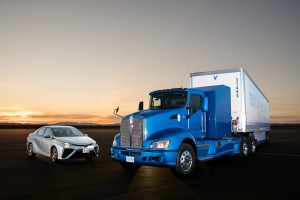UPS is putting two hydrogen-powered delivery vans on the road, the latest sign that fuel-cell technology is moving out of the lab and onto the road.
The two Class 6 vans – developed, in part, as part of a program funded by the U.S. Department of Energy – will be joined by 15 other hydrogen-powered vans by the end of 2018. UPS has been tinkering with fuel-cell technology for more than a decade as part of a broader push into energy alternatives that could reduce both the emissions and fuel costs for its vast fleet of delivery vehicles.
“We have a long history of developing and promoting the use of more sustainable alternative fuels with our Rolling Laboratory, and hope that by bringing our unique expertise to the development of hydrogen fuels, we can help advance the technology” said Mark Wallace, UPS senior vice president global engineering and sustainability.”
The project is “an essential step,” Wallace added, in the bid to prove out the potential for hydrogen power “on a commercial scale.”
UPS unveiled its first mid-size hydrogen delivery truck at the 2017 Advanced Clean Transportation Expo in Long Beach on Tuesday. From the outside, it appears to be one of the company’s conventional vans. But under the hood, the classic diesel engine has been replaced by a hydrogen fuel-cell stack and electric motors.
Fuel-cell technology was original developed in the mid-19th Century, but it only began seeing real-world application with the Apollo moon mission. More recently, a number of automotive manufacturers have been exploring the technology’s potential to replace the internal combustion engine.
Fuel cells combine hydrogen gas – usually stored in compressed form – with oxygen from the air, generating a flow of current that can be used to run the same electric motors found in battery cars and trucks. The only direct exhaust is water vapor.
The UPS vans will be powered by a 31-kiowatt fuel-cell stack, with twin 5-kilogram compressed hydrogen storage tanks. The stack will be paired with a lithium-ion battery pack that will improve throttle responsiveness and add a boost of power during hard acceleration.
Proponents see a variety of potential applications for hydrogen-powered vehicles.
Three carmakers now offer fuel-cell vehicles to retail customers in the U.S., Hyundai, Honda and Toyota. The Japanese giant recently announced it is developing a hydrogen-powered semi-truck for use at the Ports of Los Angeles and Long Beach. They would replace the conventional diesel trucks that have been blamed for heavy air pollution along the L.A. coast.
(Click Here for more on Toyota’s fuel-cell truck project.)
Salt Lake City-based Nikola Motors is also developing a heavy-duty truck, the Nikola One. And that start-up plans to set up a nationwide refueling network that would help overcome what is seen as the biggest obstacle to widespread use of fuel-cell technology, the lack of a production and distribution infrastructure.
Toyota, Honda and Hyundai are all limiting sales of their fuel-cell passenger cars to select regions of California where about 17 pumps currently are available to the public. However, state lawmakers have authorized funding to set up as many as 100 distribution points by the end of the decade.
UPS first began exploring the possibilities for hydrogen power in 2004 as part of a broader program promoting the use of alternatives fuels and power sources. The two new vans were developed as part of a $10 million Department of Energy project launched in 2014 under the Obama Administration. It is uncertain whether that and other clean energy alternatives will continue under the current White House which recently appointed a new head of the Environmental Protection Agency who, like Pres. Donald Trump, is openly skeptical of global warming.
Initially, the delivery company plans to operate one van in the Orange County area, the other near the California capital of Sacramento, both areas where they will be running near public hydrogen filling stations. Eventually, UPS said it could set up its own hydrogen pumps if the experiment proves viable.
(Click Here for a review of the hydrogen-powered 2017 Honda Clarity FCV.)
Currently, hydrogen runs as much as $15 a kilogram – a kg roughly the equivalent in energy content to a gallon of gasoline, though fuel-cell vehicles are as much as two to three times as efficient as comparable, petroleum-powered vehicles. Prices are expected to drop sharply, one supplier now targeting $10 a kilogram, and energy producers targeting a figure that would make gasoline and hydrogen roughly comparable by the end of the decade.
Atlanta-based UPS has deployed about 8,300 delivery vehicles through its Rolling Laboratory program to explore different powertrain options that also include battery-electric hybrid, propane and natural gas.
(For more on Tesla’s plans for a hydrogen-powered semi-truck and pickup, Click Here.)



